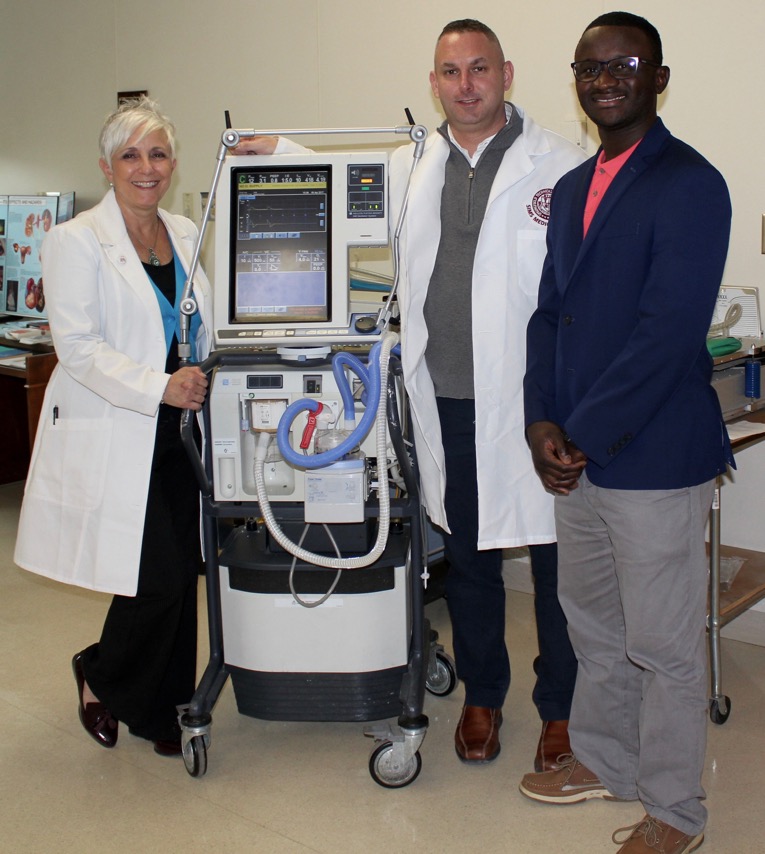STCC Respiratory Care Program trains ‘the unsung heroes of health care’

From left: Esther Perrelli Brookes, Department Chair, Respiratory Care; Scott M. Frink, Academic Coordinator of Clinical Education for the Respiratory Care Program; and Nfamara “Fams” Taal, a graduate of the Respiratory Care Program.
SPRINGFIELD, Mass. – When his baby boy was born with a breathing disorder, Nfamara “Fams” Taal decided what he wanted to do with his life: He chose to pursue a career in respiratory care.
While healthy today, the newborn suffered from a respiratory disorder that mimics asthma. He had trouble breathing. In addition to treatment from doctors and nurses, the baby received care from a respiratory therapist (RT).
“I started talking to the doctor about the disease, and I knew it had something to do with the lungs,” Taal said.
After learning about the key role RTs play in saving lives, Taal thought, ‘Wow, this is what I want to do.’”
Taal, 32, of Chicopee, enrolled in the two-year respiratory care program at the Springfield Technical Community College (STCC). He had just earned his associate degree in general studies, but knew he wanted to become an RT and needed another degree. He graduated from the program in 2015 and immediately found a job as an RT, also called a respiratory care practitioner.
Taal works at Mercy Medical Center in Springfield and Western Massachusetts Hospital in Westfield. In his rewarding profession, Taal has a range of responsibilities that require critical thinking skills. He treats, manages, diagnoses and cares for patients with cardiopulmonary dysfunction, which are breathing or heart problems. On any given day, Taal might use sophisticated equipment such as a mechanical ventilator on a medically frail patient, or he might teach a child how to properly take inhaled medicine.
He said his STCC education inspired him to give back to the small village in West Africa where he was born. He created a foundation to raise money to build a healthcare clinic in the village of Tankular in Gambia.
Everyone knows about doctors and nurses, but they don’t know about us. They call us the unsung heroes of healthcare.Nfamara "Fams" Taal, Graduate of STCC's Respiratory Care Program
Most RTs have no trouble landing jobs after earning their associate degrees, but many of them seek four-year degrees while working. Taal earned an online bachelor’s degree from Midwestern State University and plans to pursue a master’s degree.
Taal loves working in a career where he can make a meaningful difference in people’s lives. Part of a team of medical professionals, respiratory care practitioners work with doctors and nurses and make decisions that could mean life or death. In addition to facing emergency healthcare situations, RTs also teach people how to improve the quality of their lives, such as quitting smoking.
But Taal admits the profession was a mystery to him before 2012, when his son was born and needed help from an RT.
Esther Perrelli Brookes, the chair of the Respiratory Care Department at STCC, said many of her students enter the program after only recently becoming aware of these vital healthcare workers.
“That happens to a lot of people,” Perrelli Brookes said. “Either they worked in the hospital as a certified nursing assistant, a paramedic or EMT and they saw respiratory therapists in action. They might have had children or loved ones who received care from a respiratory therapist.”
“Everyone knows about doctors and nurses, but they don’t know about us,” Taal added. “They call us the unsung heroes of healthcare.”
RTs must be able to think quickly on their feet in emergency situations. They are first responders when someone is suffering from a heart attack. They treat drowning victims and accident victims who have gone into shock. They work at the bedside with patients, in emergency rooms and treat victims in LifeFlight helicopters, or air ambulances.
“With this degree from STCC, we are one of the few if not the only profession graduating with an associate degree that can work immediately in intensive care units and critical care units, right away with life saving devices,” Perrelli Brookes said.
The associate degree program at STCC is fully accredited by the Commission on Accreditation for Respiratory Care (COARC). Graduates must take a professional credentialing examination. Test-takers whose scores land in a certain high range – known as the higher cut score – become Certified Respiratory Therapists (CRTs) and qualify to take a clinical simulation examination to become a Registered Respiratory Therapist (RRT). Those who achieve the lower cut score become Certified Respiratory Therapists, but cannot take the simulation exam.
New graduates will enter a strong job market, according to the U.S. Bureau of Labor Statistics which projects a 12 percent job growth between 2014 and 2024, a faster-than-average rate. Growth in the middle-aged and elderly population is leading to an increased incidence of respiratory conditions, according to the BLS.
There were about 120,700 respiratory therapist jobs in the United States in 2014. RTs earned a median income of $58,670 per year in 2016, the BLS reports.
Interested in becoming a respiratory therapist? Apply today for the fall semester. Call the STCC admissions office at (413) 755-3333 or visit www.stcc.edu/apply. For more information about the program, visit http://www.stcc.edu/explore/programs/rspc.as/.
About Springfield Technical Community College
Founded in 1967 and located on 35 acres of the Springfield Armory National Historic Site, STCC is a major resource for the economic vitality of Western Massachusetts. As the only technical community college in Massachusetts, STCC, an Achieving the Dream Leader College, offers a variety of career programs unequalled in the state. STCC’s highly regarded transfer programs in business, engineering, liberal arts, science and technology continue to provide the most economical options for students pursuing a four-year degree. With an annual enrollment of more than 8,500 day, evening, weekend and online students, STCC is a vibrant campus rich in diversity.
For more information about STCC, visit www.stcc.edu. Follow us on Facebook and Twitter (@S_T_C_C).
Media Contact:
Jim Danko, (413) 755-4812, jdanko@stcc.edu
